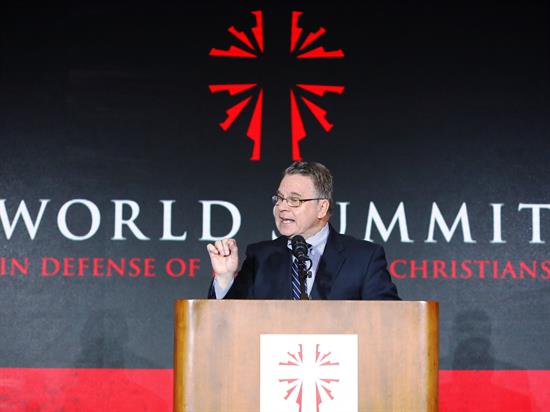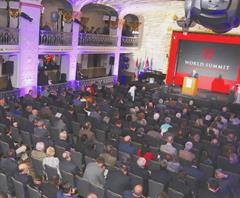Opening Remarks of Congressman Smith
Smith Addresses SummitWorld Summit in Defense of Persecuted ChristiansU.S. Rep. Chris Smith addressed the World Summit in Defense of Persecuted Christians on May 12 at the Mayflower Hotel in Washington, DC. Excerpts of his remarks: Thirty-seven years ago during my first term in Congress, I read Tortured for Christ by Romanian pastor Richard Wurmbrand. As so many of you know, it is the true story of unspeakable physical torture and psychological abuse of underground Christians under Romania’s dictator Nicolae Ceausescu and Pastor Wurmbrand’s harrowing 14-year incarceration. Sabina, his brave wife, also suffered prison and forced labor for her faith. I was moved to tears when I read it. Like so many, I was inspired by Pastor Wurmbrand’s indomitable faith, breathtaking courage and hope and challenged by his admonishment to believers to cease enabling evil by our naiveté, cold-hearted indifference or cowardly complicity. After being drugged and beaten Pastor Wurmbrand said he was in such bad shape that he even forgot the words to the Lord’s Prayer so he simply prayed: “Our Father I have forgotten the prayer, but you surely know it by heart…” Jesus’ powerful and unambiguous teaching in Matthew 25—to see those construed by the world to be the “least of these” to be as Christ Himself—applies to many. Pastor Wurmbrand was a spiritual and moral giant but situationally, the “least of these.”
Whether it be defending unborn babies and their mothers from the wanton violence of abortion or protecting the vulnerable victims of human trafficking or feeding the hungry or mitigating terrorism and war—the exponential increase in the number of persecuted Christians worldwide today, begs a far more robust, effective and sustained response. So I—all of us—are especially grateful to Rev. Franklin Graham for convening this groundbreaking World Summit in Defense of Persecuted Christians. My first religious freedom mission was to Moscow and Leningrad in 1982 on behalf of Soviet Jews. While there I also met, and prayed with the Siberian Seven—a group of Pentecostal Christians who fled to the US Embassy and lived there for five years until finally getting exit visas. During that trip—and many subsequent trips—I began to grasp Alexander Solzhenitsyn’s astute observation that communism doesn’t merely believe that God does not exist, it hates Him. Solzhenitsyn called it “militant atheism”. Like you I saw that hate throughout the Soviet Union, in Romania, the Warsaw Pact Countries—and that God-hatred continues to thrive today within dictatorships like North Korea, Cuba, Vietnam and China. On a trip to China in 1994 I had the awesome privilege of meeting with Bishop Su Zhimin. Bishop Su was a leader of the underground Catholic Church. As we spoke and then prayed, the Bishop prayed for his persecutors, he prayed for the misguided leaders of the Chinese Communist Party. Bishop Su’s body bore witness to the brutality of China’s Communist Party. He was beaten, starved, and tortured for this faith and spent some 40 years in prison. Yet, he prayed not just for the persecuted church, but for the conversion of those who hate, torture and kill. His witness and his faith absolutely amazed me. Love those who hate you as Christ did from the cross? Do good to those who persecute you? For Bishop Su these were more than words, it was his faithful and faith-filled response to one of our Lord’s most difficult teaching. Unfortunately, only couple years later Bishop Su was arrested again and disappeared. He has not been heard from since. A few years ago, on a visit to Jos, Nigeria, I visited another amazing man of faith and courage—Archbishop Ignatius Kaigama. We visited churches that had been recently firebombed by Boko Haram and spent hours listening to survivors tell their stories. At a Nigerian IDP camp, I also met with an evangelical believer—Habila Adamu. Dragged from his home by Boko Haram terrorists, he was ordered to renounce his faith. With an AK-47 pressed to his face, he was asked “are you ready to die as a Christian?” With amazing courage Habila answered, “yes, I am ready to die as a Christian.” He was asked a second time and he repeated his answer—“yes I am ready to die as a Christian.” This time, the terrorist pulled the trigger. A bullet ripped through Habila’s face. He crumpled to the ground, left for dead. By some miracle, he survived. I asked Habila to come to Washington, DC to tell his story. At a congressional hearing I chaired, Habila told my committee— “I am alive because God wants you to have this message—knowing Christ” is so much “deeper” than merely knowing Boko Haram’s story of hate and intolerance. Last month, Under Caesar’s Sword underscored the fact that Christians are the most-persecuted religious community globally. In many countries, Christians suffer genocide and face an existential threat. For many believers, refusal to renounce Jesus Christ means martyrdom, rape, torture and pain. Paradoxically—at least to the secular world—believers are nevertheless flocking to Christ despite the persecution in some of the most egregious dictatorships like China.
The world—including Chinese President Xi Jinping’s new and brutal crackdown on believers in China—is facing a religious freedom crisis. Religious persecution is festering and exploding around the world. What has been unconscionable for decades, centuries, has gotten worse. More than ever before, vigorous U.S. leadership and diplomacy are needed to address religious freedom violations globally. All the tools embedded in laws like the Frank Wolf International Religious Freedom Act need to be rigorously utilized including timely and faithful designation of “Country of Particular Concern” (CPC) status for serious offenders, the meting out of sanctions on CPC designated countries, holding not just countries but individuals who persecute to account including making such individuals inadmissible to the United States—no visa—enhanced religious freedom training for the foreign service including ambassadors and integrating religious freedom into every aspect of U.S. foreign policy. Vice President Pence spoke here yesterday and eloquently made clear that religious freedom both at home and abroad is an extremely high priority for the new administration. Thank God for that. Finally, right before last Christmas, some of my top staffers and I went to Erbil in the Kurdistan region of Iraq. Erbil is now home to some 70,000 Christian survivors of ISIS genocide. We traveled to Iraq at the invitation of Archbishop Bashar Warda, the Chaldean Catholic Archbishop of Erbil, to meet survivors and press the U.S. and United Nations to help them. The Archdiocese has been sustaining these survivors with medical care, food, and shelter, and also assisting Yezidis and Muslims who escaped ISIS. At the time, the U.S. and the U.N. humanitarian aid had refused to support the Archdiocese. Not a single penny was offered. I chaired nine congressional hearings on the issue—but to no avail. It was only through the generosity of Aid to the Church in Need, the Knights of Columbus and other charities in the U.S. and Europe that these people were able to survive. We went to a camp with 6,000 of these survivors, which had never once been visited by a U.S. official until just before we arrived. Not once. Even though it was a 10-minute drive from the U.S. Consulate in Erbil. The U.S. consulate did not want us to visit the camp, saying it was unsafe, even though they could cite no specific threats to me, my delegation or the camp. So we hitched a ride with Archbishop Warda. When we arrived, we were greeted a children’s choir singing birthday songs to Jesus for Christmas. It was a remarkable and moving sight. We then sat with Christians and heard stories of ISIS atrocities, the desecration of churches, the crucifixions of young men who refused to join ISIS, and the sexual slavery forced on some young Christian girls. We also heard stories of hope, faith and charity—and joined in prayers for the persecuted and those who persecute. After the visit, I am glad to report that this camp and others are now being visited by the U.S. and U.N. representatives who have promised aid and protection. Nevertheless, there is more work to be done for genocide victims of Iraq and Syria. The needs of genocide survivors outpaces the resources available. That is why this January I reintroduced the Iraq and Syria Genocide Emergency Relief and Accountability Act—HR 390. This bill directs the U.S. government to provide humanitarian assistance to Christians and other religious minorities who survived the genocide and support ongoing criminal investigations into perpetrators to ensure they are held accountable. HR 390 has been adopted by the Foreign Affairs Committee and we are pushing for House passage within days. Archbishop Warda warned: “what becomes of these remaining Christians will be decided based upon the actions the world will take now. And I say actions, because there is no time left for words. Truly, these coming months may well decide the fate of Christianity in Iraq: whether it survives and is given a chance for rebirth; or whether it perishes, existing only as a few scattered museum pieces with caretaker clergy, of interest to tourists and academics perhaps, but without the Christian people who had lived there for two-thousand years.”
|




